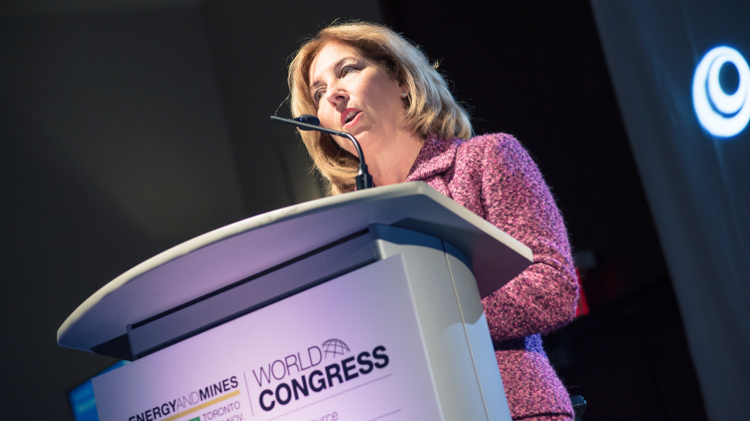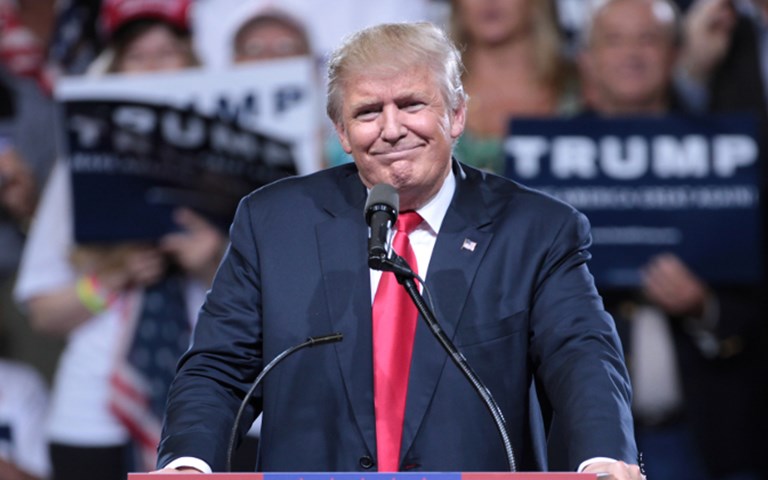Many economists believe Trump will be unable to revive the coal industry, which has been in decline for decades. Courtesy of Gage Skidmore
“You are going to be proud again to be miners,” said U.S. president-elect Donald Trump in his victory speech at the Indiana primary in May, discussing his next campaign pit-stop in West Virginia coal country and echoing a campaign-long commitment to end President Barack Obama’s “war on coal.” His campaign posters read “Trump digs coal” and coal boosters dug him right back: the top four coal-producing states – Wyoming, West Virginia, Kentucky, and typically-Democratic leaning Pennsylvania – went Republican during the United States presidential election on Nov. 8.
The overall sentiment in the industry, according to Liam Fitzgerald, national mining leader for PwC Canada, is “positive.” In the short term, leading U.S. coal miner Peabody Energy saw its stock soar by 49 per cent after Trump was named president-elect, despite filing for bankruptcy in April. “The question will be, how far will he go with his deregulation mandate? There’s still a lot of wait-and-see,” Fitzgerald said.
According to Stephen Schork, editor of The Schork Report, which provides analysis of the energy markets, Trump’s commitment to spend US$1 trillion on infrastructure upgrades will specifically benefit the metallurgical coal industry. “We are talking about major infrastructure projects,” Schork said. “We are talking about manufacturing a lot of concrete and steel to go into these projects.”
Many economists believe Trump will be unable to revive the beleaguered coal industry, which has been in decline for decades on account of environmental concerns, cheaper natural gas, and automation in mining. U.S. coal exports fell 24 per cent overall in 2015 and fell another 32 per cent in the first half of 2016. Canada is traditionally the fifth largest importer of U.S. coal, and the government’s recent decision to phase out coal by 2030 (see story) will contribute to the industry’s downturn.
Fitzgerald said that while Trump’s mandate of deregulation and commitment to infrastructure may reinvigorate the coal industry, he acknowledges that “[Trump] can only deregulate, he can’t create demand.”
Moreover, Trump’s commitment to coal has puzzled analysts given that it is at odds with his pledge to allow the “market to decide” which energy succeeds, and his simultaneous support of other fossil fuels, like natural gas, that are directly responsible for coal’s demise. John Coequyt, director of federal and international climate campaigns at the Sierra Club was quoted in an S&P Platt pre-election energy report saying “the biggest lie in [Trump’s] talking points is this notion that he’s going to bring back the coal industry while he simultaneously promotes natural gas, renewable energy and nuclear.”
Fitzgerald called Trump’s promise to let the market decide “confusing,” asking, “given that [the U.S.] has so much natural gas, is there really any need to go back to thermal coal, apart from reinvigorating an industry that is suffering?” As well, state policies play a large role in such decisions. “He doesn’t have all the power to choose one source of energy over another.”
Nevertheless, Schork is “cautiously optimistic” about the future of energy markets. He said he thinks allowing the market to choose will encourage innovation and “the potential for other technologies,” in particular carbon capture and storage.
The president-elect has historically supported the oil and gas sector, albeit less vociferously on the campaign trail. His official website states that “rather than continuing the current path to undermine and block America’s fossil fuel producers, the Trump administration will encourage the production of these resources by opening onshore and offshore leasing on federal lands and waters.”
According to Schork, Trump’s promises for infrastructure will inevitably result in “increased potential demand for natural gas, for diesel fuel for heavy industry, and also for asphalt,” on top of coal.
Trump’s affiliation with pipeline projects is another positive sign for oil and gas industry. His federal disclosure forms, published in May, revealed that he held stock in the Dakota Access Pipeline’s parent company, Energy Transfer Partners, a potential conflict of interest as the pipeline has been the focus of much protest at the Standing Rock reservation in North Dakota. Trump’s spokeperson Hope Hicks has told media outlets that the shares were sold in mid-2016 but did not clarify whether he still holds shares in Phillips 66, a company affiliated with the controversial pipeline project. The president-elect has also said he would approve the Keystone XL Pipeline, scrapped by President Barack Obama after mass environmental demonstrations in November 2015.
Environmental regulations and renewable energy adoption are expected to be set back significantly during Trump’s time in office, as he has promised to end incentives for alternative energy development and wants to dismantle a number of environmental protections currently in place.
He has suggested that he will abolish the Environmental Protection Agency (EPA); perhaps unsurprising given he tweeted that global warming was a “Chinese hoax,” and has since appointed climate change denier Myron Ebell to head the agency’s transition team. Although Schork does not believe abolishing the EPA is possible, he is hopeful for the relaxation of government regulations on the oil and gas and coal sectors.
Regardless of whether or not Trump follows through with his other environmental promises, which include killing Obama’s Clean Power Plan alongside the EPA, and backing out of the landmark 2015 Paris Agreement, which included greenhouse gas reduction targets, Fitzgerald does not believe it will affect operations for the majority of global miners. “Whether he changes U.S. policy or not, it won’t change the policies [of global miners] who have to operate in multiple jurisdictions.” Global companies are liable to other countries’ laws and existing CSR agreements. Only the handful of U.S. domestic miners will be influenced by any form of environmental policy change.
Fitzgerald said he believes the price of the U.S. dollar, commodities and foreign exchange will all be unpredictable in a Trump presidency. Miners operating in multiple jurisdictions are exposed to all three. “Volatility is going to be the new normal,” he said, adding that miners should be wary “because [volatility] is just as hard to deal with as a slump in prices.”



